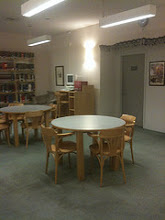
For the many stroke victims devastated by the loss of their ability to speak, music may hold the key to unlocking language, according to a new study.
The research produced often dramatic results in 12 patients whose speech was impaired after a stroke to the left hemisphere of the brain. Such patients struggle to communicate or cannot speak at all.
In the study, patients who were taught to essentially sing their words improved their verbal abilities and maintained the improvement for up to a month after the end of the therapy, according to Gottfried Schlaug, a neurology professor at Beth Israel Deaconess Medical Center and Harvard Medical School.
[From the Wall Street Journal] The patients may continue to speak in a more "sing-songy" way than a person with normal speech, but they are able to say functional phrases, such as that they are thirsty or where they live, according to Dr. Schlaug, whose work was met with enthusiastic applause after his presentation.
The treatment, called melodic intonation therapy, was devised in the 1970s after clinicians observed that some patients who suffered strokes were no longer able to talk but could still sing. However, the therapy never really caught and its efficacy hasn't been fully assessed, Dr. Schlaug said.
In melodic intonation therapy, therapists teach patients how to sing words and phrases consistent with the underlying melody of speech, while tapping a rhythm with their left hands. After frequent repetition—1.5 hour-long daily sessions with a therapist for 15 weeks—the patients gradually learn to turn the sung words into speech.
The theory behind the treatment is that there are separate brain networks associated with vocal output, with one more engaged with speech and the other with music. With certain types of stroke, fibers on the left side of the brain that are important to the interaction of the auditory and the motor system are disrupted. But if the brain could recruit the fibers from the right side, which are more engaged with music, then the system could adapt. Dr. Schlaug believes that the tapping of the left hand works to engage the auditory and motor systems.
Some 750,000 to 800,000 people in the U.S. suffer strokes each year, and 20% to 25% of those are affected by aphasia, or a deficit in language. Dr. Schlaug estimates that one-third of those aphasic patients, or about 60,000 to 70,000 a year, could benefit from the treatment if it is proven effective.
Many questions remain about the treatment, including whether the singing is the active ingredient to the treatment, or whether it is something else, such as word repetition presented in a more interesting manner. It also isn't known how important the tapping of the left hand is to the therapy. To figure out if the treatment actually works and to answer some of these questions, Dr. Schlaug has begun a randomized clinical trial comparing melodic intonation therapy to a group of patients receiving word-repetition based treatment and separately those on a waiting list.
The patients who benefit the most from the treatment are those who are able to hear the "melodic contour" of words and thus generalize their learning beyond the words taught by their therapist. The majority of the patients he has worked have this ability, he said.
"If you don't hear the words you want to say, then it doesn't really matter whether you can produce them," Dr. Schlaug said.

No comments:
Post a Comment